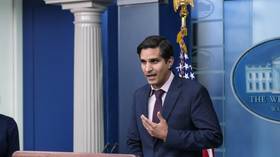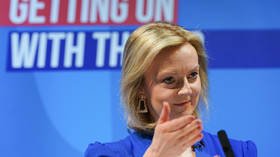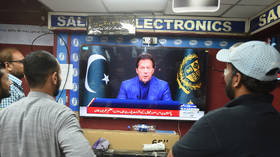US sends Russia sanctions czar to India

A US national security official – who played a leading role in crafting US economic measures against Russia over its military assault on Ukraine – will travel to India to discuss New Delhi’s response, the White House announced on Tuesday. National Security Council spokesperson Emily Horne also explained that the two sides would review their economic ties as Washington pressures allies to take tougher action against Moscow.
The deputy national security adviser for international economics, Daleep Singh, will meet, this week, with officials to “advance a range of issues in the US-India economic relationship and strategic partnership,” Horne outlined.
“Singh will consult closely with counterparts on the consequences of Russia’s unjustified war against Ukraine and mitigating its impact on the global economy,” she continued, adding that the adviser would also speak about the “development of an Indo-Pacific Economic Framework.”
Formerly of Goldman Sachs and a veteran of two previous administrations, Singh has been dubbed by multiple media outlets as the “architect” and “czar” of the anti-Russia sanctions.
The meetings in New Delhi come as the United States and some of its major allies press India to join the punitive sanctions campaign against Moscow. So far, it has declined to go along, even refusing to vote to condemn the attack at the United Nations.
India has a long history of close economic and social ties with Russia, dating back to the Soviet-era. New Delhi is also wary of the consequences of Moscow getting closer to China, and how that could affect the balance of power in Asia.
This may help explain why the Indian side agreed to purchase Russian oil at a discount earlier this month, an popular move in the West. Though officials have called for an end to the fighting in Ukraine and urged for a peaceful resolution of the conflict, the country has not budged on demands to take harsher action against Russia.
UK Foreign Secretary Liz Truss will also visit the country on Thursday, where she plans to discuss “bilateral, regional and global issues of mutual interest” with Indian FM Subrahmanyam Jaishankar. She has previously called for a “closer economic and defense relationship” with India, which she claimed has “some level of dependence on Russia.”
Russian Foreign Minister Sergey Lavrov is also set to meet with his Indian counterpart later this month following a two-day stop in China, according to the Hindustan Times. Like India, Beijing has also taken a neutral stance on the war in Ukraine, declining to condemn Russia while calling on both sides to stop fighting.
US President Joe Biden has stated that New Delhi has been “somewhat shaky” in its response to Russia – instead praising the “extremely strong” reactions of other allies such as Japan and Australia – while UK Trade Secretary Anne-Marie Trevelyan said London is “very disappointed” by India’s unwillingness to impose sanctions.
India has championed a policy of neutrality since gaining independence in 1947, maintaining ties with both the Soviet Union and the West throughout the Cold War and maintaining friendly relations with Moscow since. India has a particularly close partnership with Russia in the military sphere, as its top weapons customer, athough it also regularly cooperates with the US and other Western nations in joint military drills.














